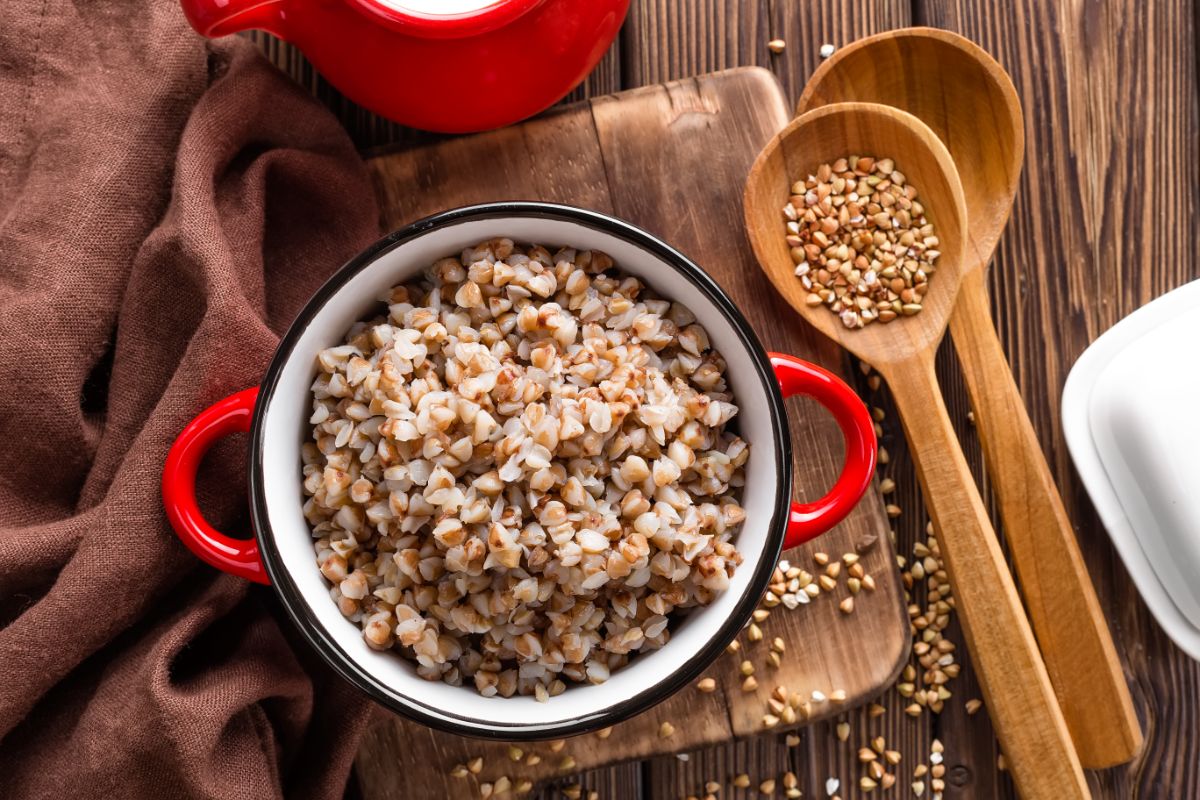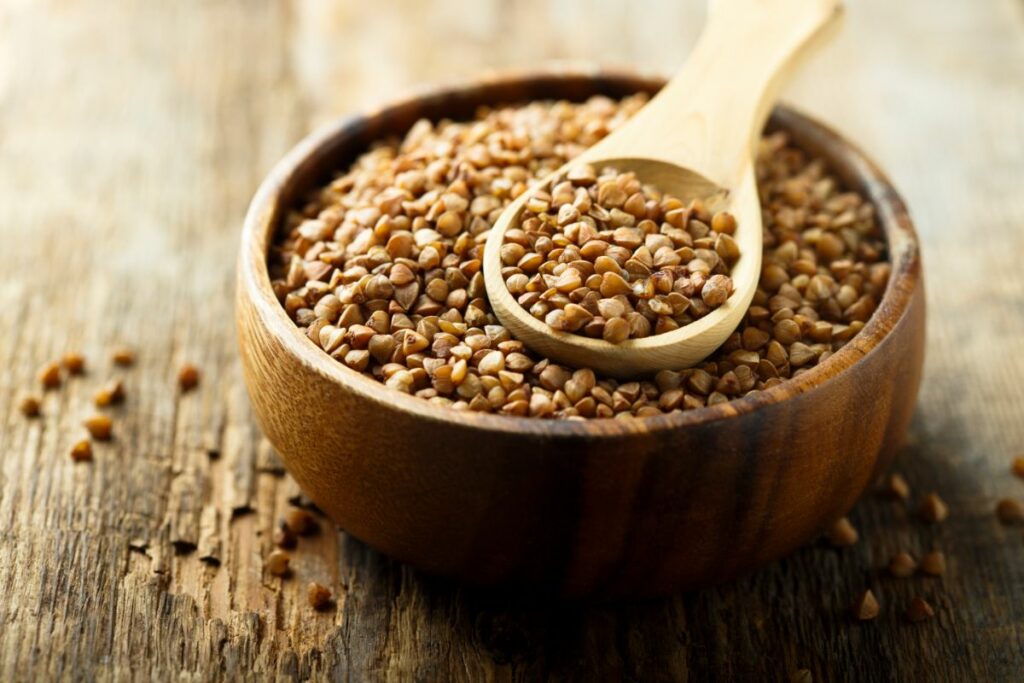While often called a superfood, what actually is buckwheat? Unsurprisingly, buckwheat is a very nutritious type of whole grain that has many health benefits.
It is said to have the ability to help with weight loss, manage the symptoms of diabetes, and even improve the health of the heart.
This is because buckwheat is a great way to consume fiber and protein, and it is also a source of energy for the body.
However, the most important thing to note is that it contains zero trace of gluten.
Because it doesn’t have any gluten included whatsoever, it means that those on a gluten-free diet, or people who can not tolerate gluten, can eat buckwheat without any issues.
Now that you know what buckwheat is, let’s take a look at it in more detail, as well as what the benefits of eating buckwheat can do for you.
What Actually Is Buckwheat?
Despite buckwheat having the word ‘wheat’ in its name, it is not considered to be a member of the wheat family.
The two types that are mainly used in food production are tartary buckwheat and common buckwheat, which are known as Fagopyrum tartaricum and Fagopyrum esculentum respectively.
The places that harvest buckwheat are usually Eastern and Central Europe and America, as well as Kazakhstan, Russia, and China.
It begins as a seed and shares a lot of properties with other ‘cereal-based’ ingredients, despite it not growing from grass like cereals often do. For this reason buckwheat is known as a pseudocereal.
Buckwheat is often used in noodles, flour, tea and groats. Groats is an ingredient which is often used in Asian cuisine in the same manner as rice.
Over time, buckwheat has become a superfood staple. This is because it is high in both antioxidants and minerals. It is also said it helps diabetics to control their blood sugar levels.
What Are The Health Benefits Of Buckwheat?
Buckwheat did not get the name superfood for nothing. It is a great source of complex carbohydrates, fiber, and protein.
It also includes the likes of potassium, iron, calcium, magnesium, and phosphorus.
The vitamins included within buckwheat include vitamins B6 and K, which are beneficial for the brain, health of cells, digestion, nerve function, blood clotting, bone building, and so much more.
Buckwheat also includes folate, riboflavin, thiamin, and niacin.
How Can Buckwheat Help With Your Heart?
Because buckwheat includes a number of compounds that are good for the body, it may help with keeping your heart healthy.
For example, buckwheat has a high level of antioxidants which are said to help prevent heart disease, as well as decrease blood pressure and the potential of a blood clot.
Due to the heart healthy factors in this type of ingredient, it makes sense to include grains within your everyday diet.
Can Buckwheat Help Control Blood Sugar Levels?
If you have high blood sugar levels over a long period of time, you may develop type 2 diabetes.
For this reason, making sure to balance your blood sugar levels post eating is a really good way to keep healthy.
Buckwheat has a GI level of low to medium, meaning even those with type 2 diabetes should be fine to eat it.
In fact, buckwheat may even help to lower blood sugar levels. Studies have shown that buckwheat has the ability to delay or prevent sugar from being digested.
For the above reasons, when it comes to both blood sugar and overall heart health, buckwheat is a great addition to your diet.
Can Buckwheat Cause Side Effects?
There are no known side effects of eating buckwheat, whether in a small amount or a large amount.
The only time buckwheat will cause a reaction is if the person has a specific allergy to buckwheat. Some of the symptoms include hives or swelling within the mouth.
Even so, this type of allergy is very rare within the United States.

How Can Buckwheat Be Added To Your Everyday Diet?
Because buckwheat is a grain, you might be wondering how you can add it to your everyday diet. Fortunately, it is not as difficult as it may first appear.
This is because you can add buckwheat to a wide range of foods and drinks within your diet. For example, you can veto the oats and choose buckwheat porridge as a health boosting alternative.
If you want another way to add buckwheat to your breakfast, you can use buckwheat flour to make delicious and fluffy pancakes.
Another option to add buckwheat to your dishes is by using groats. These can be boiled within salty water and added to the likes of salads and stir-fries. You can also eat them salt-free too.
And as we mentioned earlier, you can use buckwheat flour.
This means you can bake with buckwheat too. From muffins and cupcakes, to a delicious cake, there are many sweet alternatives to adding the superfood buckwheat grain into your diet.
Buckwheat flour is also a great way to make delicious bakes gluten-free too!
Final Thoughts
Buckwheat is a very healthy grain to consume. Not only is it naturally gluten-free, but it also includes a high amount of fiber and protein. On top of this, buckwheat also includes minerals and vitamins.
Some people confuse buckwheat as being a part of the wheat family due to its name, but it is not true.
Even so, buckwheat is a fantastic form of grain to add to your diet. There may even be other health benefits too, such as helping with blood sugar control and improving overall heart health.
Those two points alone are a very good reason to add grains such as buckwheat to your everyday diet.
They can help to boost your levels of vitamins and minerals, as well as provide helpful antioxidants to ensure your heart, body and mind stay healthy.
Frequently Asked Questions About Buckwheat
Is Buckwheat Gluten-Free?
Buckwheat is naturally gluten free. This means that if you use something like buckwheat flour, you can create gluten-free desserts and dishes.
You can also use buckwheat to put together gluten-free breakfasts and quick lunches. And not only is it gluten-free, but it is also full of protein, fiber, minerals and vitamins.
Is Buckwheat The Healthiest Grain To Eat?
Buckwheat is said to be a very healthy grain due to its high amount of minerals, but it doesn’t have the most amount of vitamins compared to other types of grains – though it does include vitamins B6 and K.
Even so, it is rich in protein, fiber and many healthy nutrients that are needed for the body to stay healthy.
Is Buckwheat Healthier Than Oatmeal?
Oatmeal is said to be one of the healthiest grains you can consume, however they generally tend to have more saturated fat than buckwheat, as well as less fiber.
Even so, oatmeal does have a fantastic source of vitamins, antioxidants and minerals – and it does include a good amount of fiber.
Buckwheat on the other hand includes lots of fiber, minerals, antioxidants and protein.
When choosing which one to eat, they are both considered to be healthy and beneficial grains to eat.








